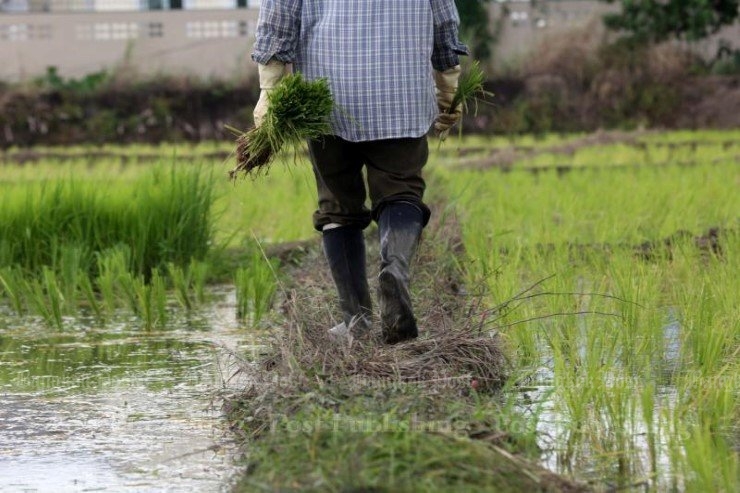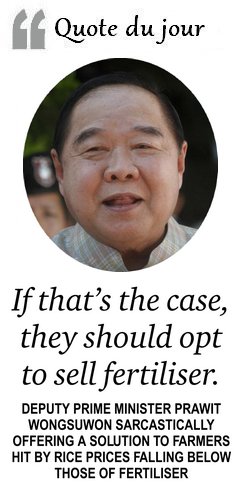
Rice is becoming difficult to swallow for the military regime as it is saddled with the dilemma of taking former prime minister Yingluck Shinawatra to task for guaranteeing higher rice prices to farmers while avoiding doing the same thing she did as it tries to skirt accusations of ignoring the plight of farmers suffering from low rice prices.
Rice, a long-time staple for Thais, has also been a favourite item in politics. The grains, however, have never been so politicised since the Yingluck Shinawatra government came up with its financially disastrous rice-pledging scheme in 2011.
The scheme, posited on the reckless assumption that if the government hoarded all the rice in the market it would be able to drive its prices up, allegedly incurred a financial loss of more than 178 billion baht from unsold stockpiles. As a result, the military regime is pursuing both criminal and civil lawsuits against the former PM, including an attempt to have her pay for part of the alleged financial damage out of her own pocket.
Both Ms Yingluck's rice-price guarantee scheme and the military regime's attempt to criminalise it are extremely polarising.

Atiya Achakulwisut is Contributing Editor, Bangkok Post.
The moves have generated a plethora of debates and conflicts that are both intellectually intense and emotionally charged. More importantly, the arguments and poles-apart standpoints adopted by different groups in society are still out in the open and far from being settled.
There may be millions of people who fully support Ms Yingluck's policy and thus find the current government's effort to hold her accountable for its alleged financial damage unfair. There are probably as many who agree with Ms Yingluck's rice-price guarantee in principle as it was a way of helping rice farmers but find its details including an agreement to buy every single grain of rice from farmers at 50% above market prices unacceptable. There are also people who completely disagree with the rice-pledging scheme both in principle and practice who naturally believe the military government criminalising it is justified.
The differences of opinions are simply endless. Against the unsettled rice policy controversies, however, came the uproar now that the price of rice has fallen to a decades-low level of 5,000 baht per tonne.

That is not just three times lower than the guaranteed price of 15,000 baht a tonne that Ms Yingluck used to promise to rice farmers during her tenure but it also essentially means a kilo of rice is cheaper than a pack of instant noodle at present.
How could this be, many people wondered? Despite its reduced role in Thailand's economic portfolio, rice and its growers still hold a special place in people's hearts. A new consensus seemed to have been formed that something must be done to help rice farmers earn higher prices for their produce.
Virtually overnight, the online community was abuzz with campaigns to help farmers avoid sure-fire losses of having to sell paddy to millers at low prices by having it milled and direct-selling the rice to consumers through social media.
Kasetsart University, for example, is offering free space for students whose families are rice farmers to sell rice free of charge. Some designers also offered free graphics for rice farmers who need them for their packaging. The direct-sale campaigns are supposed to benefit rice farmers more as they cut out profiteering by millers and middlemen.
When a lawyer questioned whether farmers selling rice through social media may be against the law, his comment was immediately countered by none other than Prime Minister Gen Prayut Chan-o-cha who said it was totally legal for rice farmers to use the new media outlets and that he supported such a move.
The PM was more politically savvy than his Deputy Prime Minister Prawit Wongsuwon who told reporters sarcastically that rice farmers should go and sell fertiliser if the material fetches a higher price than rice.
Gen Prawit's reaction, however, betrayed some of the frustration the military government must be facing. Ms Yingluck's rice-pledging scheme may have been overly ambitious, badly designed and imprudently implemented but farm price subsidies are policy staples that every government is obliged to pursue at one point or another.
By giving rice subsidies a bad name and turning the policy into a political weapon against Ms Yingluck, the military regime has cornered itself. With public sympathy decidedly with despairing rice farmers at the moment, it's the subsidy-bashing junta that has found itself in a tight spot.
